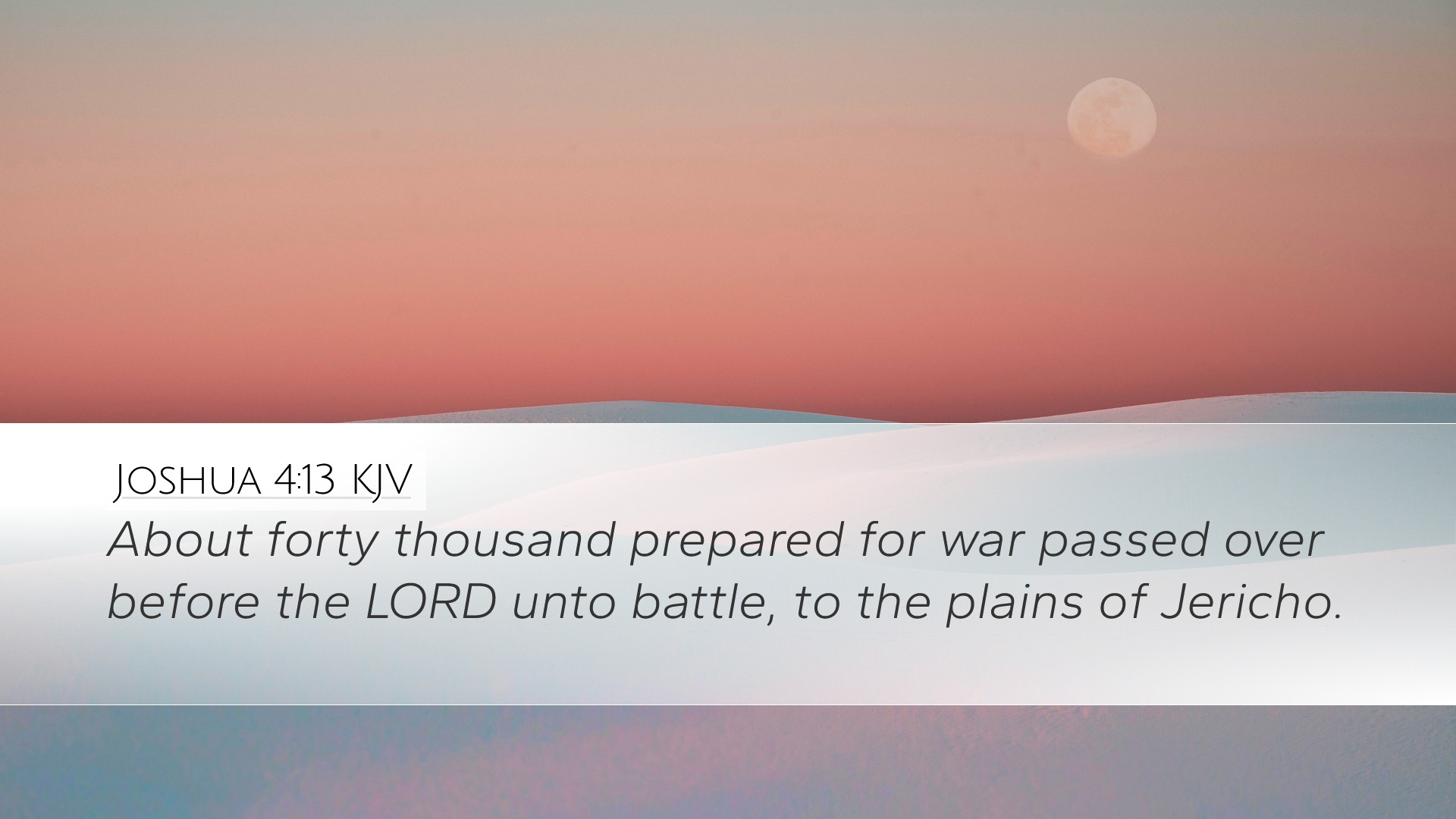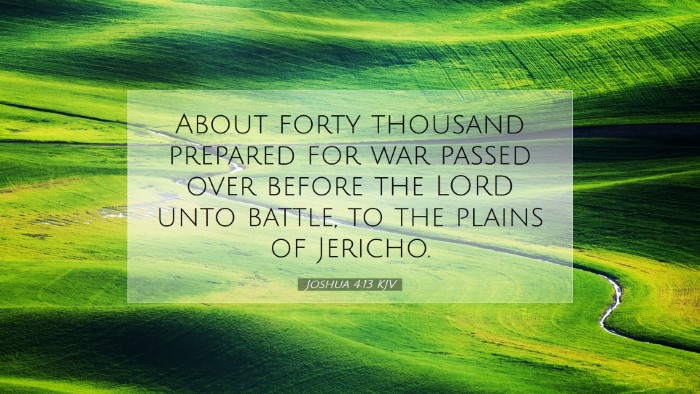Old Testament
Genesis Exodus Leviticus Numbers Deuteronomy Joshua Judges Ruth 1 Samuel 2 Samuel 1 Kings 2 Kings 1 Chronicles 2 Chronicles Ezra Nehemiah Esther Job Psalms Proverbs Ecclesiastes Song of Solomon Isaiah Jeremiah Lamentations Ezekiel Daniel Hosea Joel Amos Obadiah Jonah Micah Nahum Habakkuk Zephaniah Haggai Zechariah MalachiJoshua 4:13
Joshua 4:13 KJV
About forty thousand prepared for war passed over before the LORD unto battle, to the plains of Jericho.
Joshua 4:13 Bible Commentary
Bible Commentary on Joshua 4:13
Verse Reference: Joshua 4:13 - "About forty thousand ready armed for war passed over before the Lord unto battle, to the plains of Jericho." (KJV)
Overview
This passage captures a significant moment in Israel's history as they prepare to enter the Promised Land. Joshua 4:13 emphasizes the organization and military readiness of the Israelites, highlighting their commitment to obedience to God while simultaneously showcasing His faithfulness. This commentary will explore various facets of this verse through the insights of public domain commentators.
The Preparations for Battle
As the Israelites stand on the brink of possessive victory, we see the importance of their preparedness. Albert Barnes notes that the number "about forty thousand" signifies an army that is both considerable and well-equipped. This sets a precedent for the importance of readiness in spiritual battles as well as physical ones.
Military Readiness
Matthew Henry comments on the key role of being "ready armed for war". He emphasizes that the preparation of the Israelites was not merely a physical manifestation but a deeper spiritual readiness to undertake the tasks that God set before them. They recognized that their success depended on divine favor rather than their own strength.
Symbolism of the Number
In interpreting the significance of “forty thousand,” Adam Clarke highlights that biblical numbers often hold symbolic meanings. The number forty in the Bible is frequently associated with periods of testing or trial, while "thousand" conveys the idea of great power or a multitude. This sets the stage and context for considering the trials they faced and the might they had as they ventured into Jericho.
Divine Sovereignty and Human Responsibility
Joshua 4:13 is not just about an army passing; it reflects a balance between divine sovereignty and human responsibility. God's orchestration of events, from leading them through Jordan to commanding their future battles, aligns with the people's need for active participation in His plans.
God's Command and Human Action
Matthew Henry emphasizes that God does not work apart from His people. The Israelites marched forward in faith, indicating their cooperation with God’s directive. Their readiness to fight was essential, serving as an example for believers today that faith must be coupled with action.
The Significance of Jericho
The plains of Jericho were not only a geographical location but symbolized the first major stronghold that Israel would encounter. This was a pivotal conflict as they aimed to establish themselves firmly in the land promised to them. Albert Barnes elucidates that conquering Jericho was essential in initiating the Israelites' claim to the entirety of Canaan.
The Nature of the Conflict
Understanding the nature of the conflict that lies ahead is critical. Adam Clarke draws a parallel between the physical victory over Jericho and the spiritual victories that Christians engage in today. Both require diligence, faith, and a readiness that aligns with God's purposed plans.
Lessons for Contemporary Believers
This verse offers several pertinent lessons for modern-day believers:
- Importance of Preparation: Just as the Israelites prepared for battle, believers must be equipped—spiritually and practically—to face the challenges and trials of life.
- Faith and Action: Passive faith is insufficient. Engagement through obedience and action, as demonstrated by the Israelites, is essential to fulfilling God's commands.
- Divine Guidance: Recognition that God leads and equips His people for battle. The army's formation signifies the importance of divine direction in both literal and metaphorical battles.
- Historical Perspective: Understanding the battles of the Israelites helps frame contemporary spiritual struggles as similar in nature to the physical wars of the past.
- God's Faithfulness: The successful passage of an armed Israel signifies God’s faithfulness to His promises. It reassures believers that God continues to be with them in their ensuing struggles.
Conclusion
Joshua 4:13 is a vital verse that underscores the readiness for conflict and reliance upon God's sovereignty. It symbolizes both the historical significance of Israel's entrance into the Promised Land and the timeless spiritual truths that resonate throughout Christian thought. As pastors, students, theologians, and scholars engage with this verse, let it serve as a reminder of the intersection of faith, preparation, and obedience in the journey of faith.


